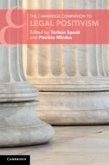The Cambridge History of Philosophy 1870-1945
Herausgeber: Baldwin, Thomas
The Cambridge History of Philosophy 1870-1945
Herausgeber: Baldwin, Thomas
- Broschiertes Buch
- Merkliste
- Auf die Merkliste
- Bewerten Bewerten
- Teilen
- Produkt teilen
- Produkterinnerung
- Produkterinnerung
Over sixty specially commissioned essays by experts in the field, accessible to non-specialists who have little previous familiarity with philosophy.
Andere Kunden interessierten sich auch für
![Cambridge Translations of Renaissance Philosophical Texts Cambridge Translations of Renaissance Philosophical Texts]() Cambridge Translations of Renaissance Philosophical Texts73,99 €
Cambridge Translations of Renaissance Philosophical Texts73,99 €![The Cambridge History of Modern European Thought 2 Volume Paperback Set The Cambridge History of Modern European Thought 2 Volume Paperback Set]() The Cambridge History of Modern European Thought 2 Volume Paperback Set102,99 €
The Cambridge History of Modern European Thought 2 Volume Paperback Set102,99 €![Fate and Utopia in German Sociology, 1870-1923 Fate and Utopia in German Sociology, 1870-1923]() Harry LiebersohnFate and Utopia in German Sociology, 1870-192337,99 €
Harry LiebersohnFate and Utopia in German Sociology, 1870-192337,99 €![The Philosophy of Life, and, Philosophy of Language The Philosophy of Life, and, Philosophy of Language]() Friedrich Von SchlegelThe Philosophy of Life, and, Philosophy of Language55,99 €
Friedrich Von SchlegelThe Philosophy of Life, and, Philosophy of Language55,99 €![The Rhetoric of Berkeley's Philosophy The Rhetoric of Berkeley's Philosophy]() Peter WalmsleyThe Rhetoric of Berkeley's Philosophy48,99 €
Peter WalmsleyThe Rhetoric of Berkeley's Philosophy48,99 €![The Philosophy of James Ward The Philosophy of James Ward]() A. H. MurrayThe Philosophy of James Ward39,99 €
A. H. MurrayThe Philosophy of James Ward39,99 €![The Cambridge Companion to Legal Positivism The Cambridge Companion to Legal Positivism]() The Cambridge Companion to Legal Positivism54,99 €
The Cambridge Companion to Legal Positivism54,99 €-
-
-
Over sixty specially commissioned essays by experts in the field, accessible to non-specialists who have little previous familiarity with philosophy.
Hinweis: Dieser Artikel kann nur an eine deutsche Lieferadresse ausgeliefert werden.
Hinweis: Dieser Artikel kann nur an eine deutsche Lieferadresse ausgeliefert werden.
Produktdetails
- Produktdetails
- Verlag: Cambridge University Press
- Seitenzahl: 974
- Erscheinungstermin: 21. Dezember 2018
- Englisch
- Abmessung: 229mm x 152mm x 52mm
- Gewicht: 1378g
- ISBN-13: 9781107628830
- ISBN-10: 1107628830
- Artikelnr.: 35117302
- Herstellerkennzeichnung
- Libri GmbH
- Europaallee 1
- 36244 Bad Hersfeld
- gpsr@libri.de
- Verlag: Cambridge University Press
- Seitenzahl: 974
- Erscheinungstermin: 21. Dezember 2018
- Englisch
- Abmessung: 229mm x 152mm x 52mm
- Gewicht: 1378g
- ISBN-13: 9781107628830
- ISBN-10: 1107628830
- Artikelnr.: 35117302
- Herstellerkennzeichnung
- Libri GmbH
- Europaallee 1
- 36244 Bad Hersfeld
- gpsr@libri.de
Introduction
Part I. 1870-1914
Section 1. The Dialectical Situation in 1870: Positivism vs. Idealism: 1. The positivist tradition
2. Neo-Kantianism: the German idealism movement
3. Idealism in Britain and the USA
4. Idealism in Russia
Section 2. The Argument Moves on: Pragmatism and the New Realisms: 5. Bergson
6. Pragmatism
7. Psychology: old and new
8. The unconscious mind
Section 3. The New Logic and the Foundations of Mathematics: 9. The new logic: revival, reform, revolution
10. Foundations of mathematics
Section 4. From Judgement to Language: 11. Theories of judgement
12. The logical analysis of language
Section 5. Physics and the Philosophy of Science: 13. The atomism debate
14. Theories of space-time in modern physics
Section 6. Philosophy of History and the Idea of Social Sciences: 15. The German debate and the Geisteswissenschaften
16. From political economy to positive economics
17. Sociology and the idea of social science
Section 7. Ethical Theory: 18. Utilitarians and idealists
19. Nietzsche
20. The new realism in ethics
Section 8. Legal and Political Theory: 21. Individualism vs. collectivism
22. Marxism and anarchism
23. Legal theory
Section 9. Philosophy and Religion: 24. Sceptical challenges to faith
25. The defence of faith
Section 10. Philosophy and the Arts: 26. Art and morality: aesthetics at 1870
27. Format and feeling: aesthetics at the turn of the century
Interlude: philosophy and the Great War
Part II. 1914-45
Section 11. Logic and Philosophy: The Analytic Programme: 28. Logical atomism
29. Logical positivism
30. The achievements of the Polish school of logic
31. Logic and philosophical analysis
Section 12. From Idealism and Naturalism to Phenomenology and Existentialism: 32. The continuing idealist tradition
33. Transformations in speculative philosophy
34. Realism, naturalism and pragmatism
35. French Catholic philosophy
36. Spanish philosophy
37. The phenomenological movement
38. Heidegger
39. Latin American philosophy
40. Japanese philosophy
Section 13. Perception, Knowledge, Language, and the End of Metaphysics: 41. Sensible appearances
42. The renaissance of epistemology
43. The solipsism debates
44. Language
45. The end of philosophy as metaphysics
Section 14. Philosophy and the Exact Sciences: 46. First-order logic and its rivals
47. The golden age of mathematical logic
48. General relativity
49. Scientific explanation
50. The rise of probabilistic thinking
Section 15. Mind and its Place in Nature: 51. Vitalism and emergentism
52. Behaviourism and psychology
53. Gestalt psychology
54. Wittgenstein's conception of mind
Section 16. Philosophy and The Social Sciences: 55. The methodology of the social sciences
56. The rise of social anthropology
57. Western Marxism and ideology critique
Section 17. Ethics and Religion: Emotivism, Intuitionism, and Authenticity: 58. From intuitionism to emotivism
59. Philosophy of religion
Section 18. Literature and Aesthetic Theory: 60. Literature as philosophy
61. Aesthetics between the wars: art and liberation
Section 19. The Decline of Europe: 62. The liberal democratic state: defences and developments, 1918-45
63. Hans Kelsen and normative legal positivism
64. The liberal democratic state - critics
Bibliographical appendix
Bibliography.
Part I. 1870-1914
Section 1. The Dialectical Situation in 1870: Positivism vs. Idealism: 1. The positivist tradition
2. Neo-Kantianism: the German idealism movement
3. Idealism in Britain and the USA
4. Idealism in Russia
Section 2. The Argument Moves on: Pragmatism and the New Realisms: 5. Bergson
6. Pragmatism
7. Psychology: old and new
8. The unconscious mind
Section 3. The New Logic and the Foundations of Mathematics: 9. The new logic: revival, reform, revolution
10. Foundations of mathematics
Section 4. From Judgement to Language: 11. Theories of judgement
12. The logical analysis of language
Section 5. Physics and the Philosophy of Science: 13. The atomism debate
14. Theories of space-time in modern physics
Section 6. Philosophy of History and the Idea of Social Sciences: 15. The German debate and the Geisteswissenschaften
16. From political economy to positive economics
17. Sociology and the idea of social science
Section 7. Ethical Theory: 18. Utilitarians and idealists
19. Nietzsche
20. The new realism in ethics
Section 8. Legal and Political Theory: 21. Individualism vs. collectivism
22. Marxism and anarchism
23. Legal theory
Section 9. Philosophy and Religion: 24. Sceptical challenges to faith
25. The defence of faith
Section 10. Philosophy and the Arts: 26. Art and morality: aesthetics at 1870
27. Format and feeling: aesthetics at the turn of the century
Interlude: philosophy and the Great War
Part II. 1914-45
Section 11. Logic and Philosophy: The Analytic Programme: 28. Logical atomism
29. Logical positivism
30. The achievements of the Polish school of logic
31. Logic and philosophical analysis
Section 12. From Idealism and Naturalism to Phenomenology and Existentialism: 32. The continuing idealist tradition
33. Transformations in speculative philosophy
34. Realism, naturalism and pragmatism
35. French Catholic philosophy
36. Spanish philosophy
37. The phenomenological movement
38. Heidegger
39. Latin American philosophy
40. Japanese philosophy
Section 13. Perception, Knowledge, Language, and the End of Metaphysics: 41. Sensible appearances
42. The renaissance of epistemology
43. The solipsism debates
44. Language
45. The end of philosophy as metaphysics
Section 14. Philosophy and the Exact Sciences: 46. First-order logic and its rivals
47. The golden age of mathematical logic
48. General relativity
49. Scientific explanation
50. The rise of probabilistic thinking
Section 15. Mind and its Place in Nature: 51. Vitalism and emergentism
52. Behaviourism and psychology
53. Gestalt psychology
54. Wittgenstein's conception of mind
Section 16. Philosophy and The Social Sciences: 55. The methodology of the social sciences
56. The rise of social anthropology
57. Western Marxism and ideology critique
Section 17. Ethics and Religion: Emotivism, Intuitionism, and Authenticity: 58. From intuitionism to emotivism
59. Philosophy of religion
Section 18. Literature and Aesthetic Theory: 60. Literature as philosophy
61. Aesthetics between the wars: art and liberation
Section 19. The Decline of Europe: 62. The liberal democratic state: defences and developments, 1918-45
63. Hans Kelsen and normative legal positivism
64. The liberal democratic state - critics
Bibliographical appendix
Bibliography.
Introduction
Part I. 1870-1914
Section 1. The Dialectical Situation in 1870: Positivism vs. Idealism: 1. The positivist tradition
2. Neo-Kantianism: the German idealism movement
3. Idealism in Britain and the USA
4. Idealism in Russia
Section 2. The Argument Moves on: Pragmatism and the New Realisms: 5. Bergson
6. Pragmatism
7. Psychology: old and new
8. The unconscious mind
Section 3. The New Logic and the Foundations of Mathematics: 9. The new logic: revival, reform, revolution
10. Foundations of mathematics
Section 4. From Judgement to Language: 11. Theories of judgement
12. The logical analysis of language
Section 5. Physics and the Philosophy of Science: 13. The atomism debate
14. Theories of space-time in modern physics
Section 6. Philosophy of History and the Idea of Social Sciences: 15. The German debate and the Geisteswissenschaften
16. From political economy to positive economics
17. Sociology and the idea of social science
Section 7. Ethical Theory: 18. Utilitarians and idealists
19. Nietzsche
20. The new realism in ethics
Section 8. Legal and Political Theory: 21. Individualism vs. collectivism
22. Marxism and anarchism
23. Legal theory
Section 9. Philosophy and Religion: 24. Sceptical challenges to faith
25. The defence of faith
Section 10. Philosophy and the Arts: 26. Art and morality: aesthetics at 1870
27. Format and feeling: aesthetics at the turn of the century
Interlude: philosophy and the Great War
Part II. 1914-45
Section 11. Logic and Philosophy: The Analytic Programme: 28. Logical atomism
29. Logical positivism
30. The achievements of the Polish school of logic
31. Logic and philosophical analysis
Section 12. From Idealism and Naturalism to Phenomenology and Existentialism: 32. The continuing idealist tradition
33. Transformations in speculative philosophy
34. Realism, naturalism and pragmatism
35. French Catholic philosophy
36. Spanish philosophy
37. The phenomenological movement
38. Heidegger
39. Latin American philosophy
40. Japanese philosophy
Section 13. Perception, Knowledge, Language, and the End of Metaphysics: 41. Sensible appearances
42. The renaissance of epistemology
43. The solipsism debates
44. Language
45. The end of philosophy as metaphysics
Section 14. Philosophy and the Exact Sciences: 46. First-order logic and its rivals
47. The golden age of mathematical logic
48. General relativity
49. Scientific explanation
50. The rise of probabilistic thinking
Section 15. Mind and its Place in Nature: 51. Vitalism and emergentism
52. Behaviourism and psychology
53. Gestalt psychology
54. Wittgenstein's conception of mind
Section 16. Philosophy and The Social Sciences: 55. The methodology of the social sciences
56. The rise of social anthropology
57. Western Marxism and ideology critique
Section 17. Ethics and Religion: Emotivism, Intuitionism, and Authenticity: 58. From intuitionism to emotivism
59. Philosophy of religion
Section 18. Literature and Aesthetic Theory: 60. Literature as philosophy
61. Aesthetics between the wars: art and liberation
Section 19. The Decline of Europe: 62. The liberal democratic state: defences and developments, 1918-45
63. Hans Kelsen and normative legal positivism
64. The liberal democratic state - critics
Bibliographical appendix
Bibliography.
Part I. 1870-1914
Section 1. The Dialectical Situation in 1870: Positivism vs. Idealism: 1. The positivist tradition
2. Neo-Kantianism: the German idealism movement
3. Idealism in Britain and the USA
4. Idealism in Russia
Section 2. The Argument Moves on: Pragmatism and the New Realisms: 5. Bergson
6. Pragmatism
7. Psychology: old and new
8. The unconscious mind
Section 3. The New Logic and the Foundations of Mathematics: 9. The new logic: revival, reform, revolution
10. Foundations of mathematics
Section 4. From Judgement to Language: 11. Theories of judgement
12. The logical analysis of language
Section 5. Physics and the Philosophy of Science: 13. The atomism debate
14. Theories of space-time in modern physics
Section 6. Philosophy of History and the Idea of Social Sciences: 15. The German debate and the Geisteswissenschaften
16. From political economy to positive economics
17. Sociology and the idea of social science
Section 7. Ethical Theory: 18. Utilitarians and idealists
19. Nietzsche
20. The new realism in ethics
Section 8. Legal and Political Theory: 21. Individualism vs. collectivism
22. Marxism and anarchism
23. Legal theory
Section 9. Philosophy and Religion: 24. Sceptical challenges to faith
25. The defence of faith
Section 10. Philosophy and the Arts: 26. Art and morality: aesthetics at 1870
27. Format and feeling: aesthetics at the turn of the century
Interlude: philosophy and the Great War
Part II. 1914-45
Section 11. Logic and Philosophy: The Analytic Programme: 28. Logical atomism
29. Logical positivism
30. The achievements of the Polish school of logic
31. Logic and philosophical analysis
Section 12. From Idealism and Naturalism to Phenomenology and Existentialism: 32. The continuing idealist tradition
33. Transformations in speculative philosophy
34. Realism, naturalism and pragmatism
35. French Catholic philosophy
36. Spanish philosophy
37. The phenomenological movement
38. Heidegger
39. Latin American philosophy
40. Japanese philosophy
Section 13. Perception, Knowledge, Language, and the End of Metaphysics: 41. Sensible appearances
42. The renaissance of epistemology
43. The solipsism debates
44. Language
45. The end of philosophy as metaphysics
Section 14. Philosophy and the Exact Sciences: 46. First-order logic and its rivals
47. The golden age of mathematical logic
48. General relativity
49. Scientific explanation
50. The rise of probabilistic thinking
Section 15. Mind and its Place in Nature: 51. Vitalism and emergentism
52. Behaviourism and psychology
53. Gestalt psychology
54. Wittgenstein's conception of mind
Section 16. Philosophy and The Social Sciences: 55. The methodology of the social sciences
56. The rise of social anthropology
57. Western Marxism and ideology critique
Section 17. Ethics and Religion: Emotivism, Intuitionism, and Authenticity: 58. From intuitionism to emotivism
59. Philosophy of religion
Section 18. Literature and Aesthetic Theory: 60. Literature as philosophy
61. Aesthetics between the wars: art and liberation
Section 19. The Decline of Europe: 62. The liberal democratic state: defences and developments, 1918-45
63. Hans Kelsen and normative legal positivism
64. The liberal democratic state - critics
Bibliographical appendix
Bibliography.








